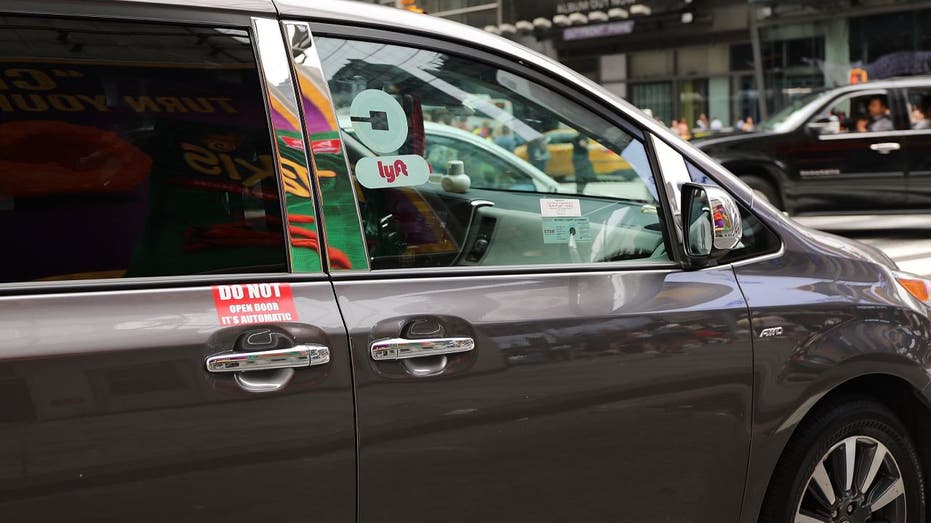Share of gig workers hit a new high in March
The Bank of America Institute's report found that the share of the bank's customers with income from gig work hit a new high in March
Charles Payne: Boomers saw their net worth climb, but millennials lost
'Making Money' host Charles Payne addresses the debate about higher interest rates being a positive for society.
The share of gig workers in the U.S. reached its highest level on record in March, according to a new analysis from the Bank of America Institute.
The report found that the share of customers at Bank of America, the nation's second-largest bank, who received income from gig platforms through direct deposits or debit cards, increased to more than 3.8% in March 2024, above the previous peak that was reached in early 2022.
It found that ride-sharing drove most of the growth in gig work over the last year and became the most common form of gig work among Bank of America customers, while social commerce and deliveries moderated from their December 2021 highs.
"Ride-sharing is a major contributor to the rise in gig work due, in part, to a near return to pre-pandemic levels of traffic and a possible preference for ridesharing compared to public transportation," Joe Wadford, economist at the Bank of America Institute, told FOX Business. "Another way of looking at this, the reason gig work is increasing is that people are returning to pre-pandemic levels of activity but might be exhibiting slightly new behaviors resulting from the pandemic (e.g. traveling in less-crowded spaces)."
BIDEN ADMIN'S GIG WORKER RULE FACING GROWING PUSHBACK

The Bank of America Institute's report found that the share of the bank's customers with income from gig work hit a new high in March. (Spencer Platt/Getty Images / Getty Images)
Ride-sharing ranked as the second-largest gig work income source, trailing only vacation rentals, which Wadford noted have higher barriers to entry for workers given the costs associated with owning a home or a property that can be used for short-term rentals versus the cost of owning a car.
Vacation rentals remained the least common source of gig work income and the barriers to entry in that subset of gig work were reflected in relatively higher use by members of the baby boomer and traditionalist generations. The report found those proportions gradually decreased among younger generations, with Gen X slightly above millennials, who in turn were marginally higher than Gen Z.
SURGE IN US SMALL BUSINESSES STARTED AS SIDE HUSTLES

Younger generations of workers were more likely to pursue ride-sharing as a gig work opportunity, the report found. (Getty Images / Getty Images)
"One notable trend in gig work, as it relates to age, has been the recovery in the share of Gen Z and millennial gig workers over the past year," Wadford added. "Additionally, the share of Gen Xers earning income from gig work reached a new peak in early 2024."
Noting the divide between younger and older generations in terms of their tendency toward gig work, Wadford added, "In our view, health and safety might be a factor in the lower share of baby boomers and traditionalists performing gig work. We see signs in our data that baby boomers and traditionalists may prefer work with a social distancing aspect."
SEARCHES FOR AI SKILLS ON GIG PLATFORM SURGE AS BUSINESSES EMBRACE NEW TECH

The Bank of America Institute's report found that the trend of gig work replacing traditional full-time jobs for some workers has continued in recent years. (Alastair Pike/AFP via Getty Images / Getty Images)
The Bank of America Institute's report also noted that workers are increasingly turning to gig work in lieu of traditional full-time jobs, with the internal Bank of America data showing a gradual decline in gig workers also getting paychecks from traditional jobs dating back to 2022 and workers receiving year-round gig income continuing its rise since 2021.
"The share of gig workers who also receive a direct deposit from a traditional job, aka full-time jobs, has been trending down slightly since mid-2022," Wadford explained.
"The share of gig workers who receive gig income all 12 months of the year, our proxy for full-time gig work, has been increasing every year since 2021. These signs of increasing full-time gig work may prove to be a reliable tailwind to consumers, as gig work potentially provides consistent employment without the need for additional income from traditional jobs."
| Ticker | Security | Last | Change | Change % |
|---|---|---|---|---|
| BAC | BANK OF AMERICA CORP. | 56.53 | +1.59 | +2.89% |
GET FOX BUSINESS ON THE GO BY CLICKING HERE
Wadford also touched on the decline in gig work from its early 2022 peak to its most recent trough in early 2023, after which gig work has recovered those losses and reached the new peak this year.
"Fewer gig workers from the early 2022 peak to the most recent troughs in early 2023 seems to reflect the broader shift in consumer spending to services from goods," he said. "The shift in consumer spending to services from goods is likely reflected in the decline in social commerce gigs that began in early 2022, however, the gains in ride-sharing offset the declines in social commerce beginning in early 2023."




















